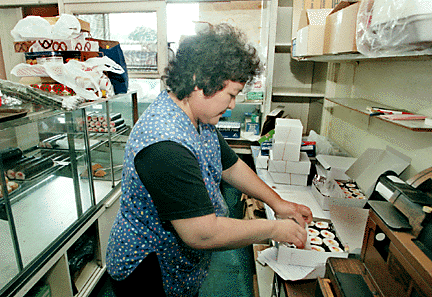

By Dennis Oda, Star-Bulletin
Dr. Chris Yamamoto, one of hundreds of regular
customers at Naka's Okazuya, stops by to thank
Katherine Nagamine and others who work at the Kalihi
establishment, which closed Christmas Eve.
Okazuya leaves
sweet memories
The family-run Naka's closes
By Rod Ohira
with nearly half a century of
hard work and good food
Star-BulletinNaka's Okazuya in Kalihi is gone, leaving hundreds of regular customers with only fond memories of Nancy's chow fun, Flora's macaroni salad and the Nakasone family's famed cone sushi.
The last official day of business for the little hole-in-the-wall okazuya at 2033 N. King St. was Christmas Eve.
But Nancy Nakasone Murakami -- the eldest of Tokusuke and Kameko Nakasone's nine children, who for over 30 years has been running the okazuya started by her mother -- and her working partner and sister-in-law, Flora Nakasone, have been going to the shop daily to clean up.
They've also been making sushi to give to friends. "It's our way of saying thank you to them for their support over the years," Murakami said.
Dr. Chris Yamamoto, an optometrist, came to Naka's twice a week for chow fun, macaroni salad, fried chicken and musubi.
"Naka's was special," Yamamoto said. "Where else would you find a place with no parking that's always busy?
"When you came in, they were always smiling. The chow fun was the best, not oily or greasy. And Flora's mac salad with onions, celery and cabbage was really good. I'm missing it already."
Murakami, 68, closed Naka's because no one was interested in continuing the family business, and painful knees prevented her from continuing.

"If you're dedicated, you can make money doing this," Murakami said. "I'm not closing for anything that has to do with the bad economy. It's because I have to stand to work, and I can't do it much longer."We'll miss our customers, but there's gratification knowing that they enjoyed our food all these years. I was the cook and could never miss a day of work. I'm thankful that God took care of me and let me do this for so long."
The roots of Naka's success go back a half-century to Waipahu's sugar camp, when Kameko Nakasone began chasing her dream of having an okazuya.
Murakami's parents were second-generation Hawaii residents, the children of immigrants from Okinawa. They worked as laborers until 1941, when the late Tokusuke Nakasone started raising hogs.
Kameko's maiden name is Shiroma, and her family owned a popular saimin shop in Waipahu's Higashi camp. A replica of the original shop is on display at Waipahu Cultural Garden Park, Flora Nakasone said.
Kameko Nakasone went into business in late 1949 or early 1950, opening a small grocery store named Naka's near Mayor Wright Housing.
"She had a one-year lease and it expired, so she moved to Desha Lane (in Palama)," Murakami said. "She opened an okazuya across the street from the store in 1952."
The first Naka's Okazuya did not enjoy immediate success.
"My mom didn't know how to cook (okazuya food)," said Doris Asato, Nancy's sister. "All she used to cook was beans -- lima beans, kidney beans.
"Gradually, the customers started telling her to make other things, like chow fun."
Tokusuke Nakasone helped his wife at the okazuya by making musubi and sushi, Murakami said.
In the late 1950s, Murakami suggested another site.
"I saw a for-sale sign out on the shop, and Mama bought it," Murakami said of the North King Street location. "For a while, she was cooking for both okazuyas."
Kameko began teaching her daughter how to cook while Murakami was helping at the Kalihi store.
"Cone sushi was her pride, and Mama was still coming in to make sushi up to three years ago," Murakami said.
Kameko, 89, currently lives with Flora and her husband.
Murakami says there are no secret family recipes but attributes the taste to preparation, which is the most difficult part of the okazuya business.
From 2:30 p.m., when the okazuya closes, to about 7:30 p.m., the women clean up the store and begin preparing for the next day.
"They chop the onions and celery by hand, so tiny," Yamamoto said. "I tried to learn the secrets, but it doesn't come out. It's just so hard and time-consuming."
When their workday was done, Nancy and Flora went home to cook for their families.
"I was cooking to 11 at night," said Flora, who has three sons -- Lance, Lloyd and Lyle -- and a daughter, Lynne Monahan.
Nancy's five children -- sons Paul, Melvin and Bert, and daughters Sharon Kaneakua and Charlene Kamiya, who works at the okazuya -- are not interested in taking over.
"It's a hard job, 18 hours a day, so you have to be really dedicated," Murakami said. "We cut back to five days a week two years ago, and maybe, if I had done it sooner, I would have been able to last longer."
Murakami has received numerous offers for one piece of equipment at the store that she won't part with.
"The wok they used has years of sweat in it, and anything you cook in it comes out good," Yamamoto said. "I really wanted to buy it."
As okazuyas close, they are rarely replaced.
"Everything now is done by machines," Flora Nakasone said. "To me, when you make sushi by hand, it's better than a machine."